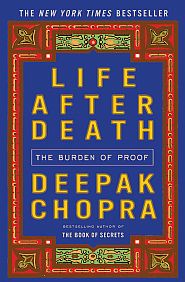![]()
Shri Mataji: "There should be no fear of death but on the contrary should be welcomed"
"What was most magical in my childhood was transformation. Death itself was seen as a brief stopping point on an endless soul journey that could turn a peasant into a king and vice versa. With the possibility of infinite lifetimes extending forward and backward, a soul could experience hundreds of heavens and hells. Death ended nothing; it opened up limitless adventures.”- Deepak Chopra
The Messiah-Paraclete-Ruh-Devi
The Way Of Our Spiritual Growth And Sahaja Penance,
London, U.K. — April 22, 1984
"And when you die what happens to you is a very simple thing; that you feel liberated, absolutely, and then you feel your freedom, completely, and you can decide what to do. It's all under your own guidance, your own desires, everything works out. You don't feel that you have come out of your body and this is what (I) should tell you: that there should be no fear of death but on the contrary should be welcomed because you will feel much more liberated, much more at ease.”
The Messiah-Paraclete-Ruh-Devi
To Achieve Complete Freedom, Cabella, Italy — May 7, 1995

Death ended nothing; it opened up limitless adventures
"Memoir: The Life Beyond
While writing this book on the afterlife, I kept being drawn back to stories that I'd heard in India as a child. Parables are a powerful way to teach children, and many of the ones told to me have lasted all my life. So I decided to weave the book around tales of the kind I heard at home, around the temples, and at school, hoping that the reader would be enticed by a world where heroes battle darkness in order to emerge into the light.
In this case the hero is a woman, Savitri, and the enemy she must defeat is Yama, the lord of death. Yama shows up in her front yard one day, waiting to take away her husband the moment he returns from his work as a woodcutter. Savitri is terrified. What strategy could possibly turn Death away from his inexorable mission?
I had no trouble imagining these characters. I was frightened for Savitri and anxious to find out how her battle of wits with Death turned out. Their world flowed easily into my own, because the India of my childhood was not that far removed from ancient India. I want to take a moment to convey what death and the world beyond meant back then. It may seem like a very esoteric place. If so, you can come back to it after reading the main body of the book. However mysterious and exotic, here is where I began.
What was most magical in my childhood was transformation. Death itself was seen as a brief stopping point on an endless soul journey that could turn a peasant into a king and vice versa. With the possibility of infinite lifetimes extending forward and backward, a soul could experience hundreds of heavens and hells. Death ended nothing; it opened up limitless adventures. But at a deeper level, it's typically Indian not to crave permanence. A drop of water becomes vapor, which is invisible, yet vapor materializes into billowing clouds, and from clouds rain falls back to earth, forming river torrents and eventually merging into the sea. Has the drop of water died along the way? No, it undergoes a new expression at each stage. Likewise, the idea that I have a fixed body locked in space and time is a mirage. Any drop of water inside my body could have been ocean, cloud, river, or spring the day before. I remind myself of this fact when the bonds of daily life squeeze too tight.
In the West the hereafter has been viewed as a place akin to the material world. Heaven, hell, and purgatory lie in some distant region beyond the sky or under the earth. In the India of my childhood the hereafter wasn't a place at all, but a state of awareness.
The cosmos that you and I are experiencing right now, with trees, plants, people, houses, cars, stars, and galaxies, is just consciousness expressing itself at one particular frequency. Elsewhere in spacetime, different planes exist simultaneously. If I had asked my grandmother where heaven was, she would have pointed to the house we lived in, not only because it was full of love, but because it made sense to her that many worlds could comfortably inhabit the same place. By analogy, if you are listening to a concert orchestra, there are a hundred instruments playing, each occupying the same place in space and time. You can listen to the symphony as a whole or, if you wish, put your attention on a specific instrument. You can even separate out the individual notes played by that instrument. The presence of one frequency does not displace any of the others.
I didn't know it as a child, but when I walked around the crowded Delhi market where more humanity was packed into one bazaar than was possible to imagine, the world I couldn't see was even more crowded. The air that I breathed contained voices, car noises, bird songs, radio waves, X-rays, cosmic rays, and an almost infinite array of subatomic particles. Endless realities lay all around me.”
Deepak Chopra, Life After Death: The Burden of Proof
Harmony; 1 edition (October 17, 2006), pages 1-2
ISBN-10: 0307345785
ISBN-13: 978-0307345783
"General George Patton of World War II fame, no stranger to personal reincarnational remembrances (he claimed to recall previous battlefield experiences as Napoleon), once observed," For Hindus death is the most exalted experience of life.”This idea is naturally hard for non-Hindus to grasp — all the more so for atheists facing Eternal Oblivion and those of Abrahamic faiths which define death as a punishment for man's sinful disobedience. To them, death is the ultimate sign of man's spiritual failure, a belief which arouses instincts of denial and injustice. One may feel penitent and guilty, not to mention uncertain about the destination ahead.
No such thoughts attend the dying days of a Hindu. Of course, there is much sadness surrounding the passing of friends and family, but that is honest acknowledgement of our loving attachments. Inside we know death is OK, natural, that the soul, even if it was less than perfect in this life, is continuing its appointed journey across life's oceanic phenomena toward Liberation and will, in time and without fail, reach the other shore. The Hindu's presumption of numerous births mitigates the tragedy of death, whether the passage is his own or another's. So, Hindus call death by lofty names — Maha Samadhi,"Great Superconscious State"And Maha Prasthana,"Great Departure.”To be near an awakened soul at the time he or she gives up the body is considered among the most blessed of opportunities. While ordinary people are remembered on their day of birth, Hindus honor enlightened souls on the day of their departure, translated in English as"liberation day.” "
Himalayan Academy, 1998. www.hinduismtoday.kauai.hi.us/welcome.html
"Those who have spiritual enlightenment tell us that the basic cause of fear of death is our metaphysical or spiritual ignorance, which lies in the identification of the spirit with the body. As long as we are not aware of our true spiritual essence, of the reality of the spirit or the true self within us, it is natural that we are subjected to this fear of death.. The body is subject to the laws of nature. It is born, it grows, it attains maturity, it declines and it perishes. When we identify with this body and we have no understanding of our spiritual essence, naturally we feel that decline and eventual disintegration of the body mean our decline and destruction. So in all religions, the great spiritual geniuses have declared unequivocally that the more we know of our true spiritual essence of our being, the more we overcome the fear of death. We take a deeper perspective. We realize destruction of the body does not involve destruction of our spiritual nature, which is immortal and imperishable in character. Therefore, it is evident that the best way to conquer and overcome this fear of death is to sharpen our spiritual understanding and experience...
As the great philosopher Spinoza said, the essence of spiritual wisdom is to be able to behold life under the aspect of eternity.”
Dr. Haridas Chaudhuri, The Essence of Spiritual Philosophy
Thorsons Publishing Group, UK, 1990, p. 133-6.
.”.. ato become the very self of every being' (BG. 5.7) does not mean the loss of a personal relationship with God, and probably with other liberated beings as well. This is in line with at least one type of Upanishadic thought typified in the dialogue between Indra and Prajapati in Chandogya Upanishad 8. The relevant passage is 8.12, 1- 3:
Bountiful One! For sure this body is mortal, held in the grip of death. Yet it is the dwelling-place of the immortal, incorporeal self. And this self, while still in the body, is held in the grip of pleasure and pain; and so long as it remains in the body there is no means of ridding it of pleasure and pain. But once it is freed from the body, pleasure and pain cannot as so much touch it.
The wind has no body. Clouds, thunder, and lightning — these too have no body. So, just as these arise from the broad expanse of space up there and plunge into the highest light, revealing themselves each in their own form, so too does this deep serenity arise out of this body and plunge into the highest light, revealing itself in its own form. Such a one is a superman (uttara purusa); and there he roves around, laughing, playing, taking his pleasure with women, chariots, or friends and remembering no more that excrescence which was his body...
Liberation is no longer the isolation of the classical Samkhya-Yoga: rather it is the end of what Christians mystics call as via purgativa, the way of the vishuddh'tma, the 'purified self' (5.7: cf. 5.11:6.12.) It is the beginning of the personal encounter of the integrated and liberated self with God.”
R.C. Zaehner, BhagavadGita
Oxford University Press, 1969, p. 234.
Related Articles;
Shri Mataji: "There should be no fear of death but on the contrary...”
Shri Mataji: "But you know that you have eternal life.”
Shri Mataji: "Death does not exist for you — It is finished.”
Shri Mataji: "Many people ask Me questions: "What about death?” "
Shri Mataji: "The Reality is so beautiful. It is just lying ahead of us.”
Shri Mataji: "You have all the control, all the powers ...”
Arwinder: "I think He (Shri Buddha) is big ... a bit bald.”
God Realization - Not Just Sermonizing
The Mystic Vision - Daily Encounters with the Divine
Realisation Of God Starts With Cosmic Vision
Jesus was a Jewish heretic. Buddha was a Hindu heretic
The mystics offer us their personal testimonies
Now and again a daring soul, desiring immortality, has ...
Arwinder, what it is to be a spirit?
The general resurrection occurs just before the final judgment and ...
Nirvikalpa Samadhi and Self-Knowledge by Dr. Harsh K. Luthar
Archives of FAQs and Articles on Shakti/Last Judgment/Qiyamah
Homepage
Disclaimer: Our material may be copied, printed and distributed by referring to this site. This site also contains copyrighted material the use of which has not always been specifically authorized by the copyright owner. We are making such material available to our readers under the education and research provisions of "fair use" in an effort to advance freedom of inquiry for a better understanding of religious, spiritual and inter-faith issues. The material on this site is distributed without profit. If you wish to use copyrighted material for purposes other than "fair use" you must request permission from the copyright owner.